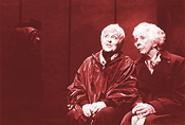This year, he has turned from psychedelic to khaki. If sincerity and good intentions made for great theater, Touch the Names: Letters to the Vietnam Veterans Memorial would be the great Vietnam war play we've been looking for. Eschewing the kitschy choreography, Madonna mics, slides, and pyrotechnics that turned the recent musical The Civil War into a history lesson by way of Vegas, this show strives to be morally pure, avoiding in its austerity the taint of show business.
Its 10-member cast is well-coached by co-writer Myler in projecting earnestness and vexation. Each actor takes rotating turns at interpreting letters left by grieving friends and family members at the memorial. We have 73 minutes of missed Christmases, unseen grandchildren, undrunk kegs of beer, guilt over surviving, and rumination concerning overzealousness in killing.
Any 10 minutes of this is deeply moving; any 20 minutes starts to run dangerously from pathos into bathos. After a half-hour, a numbing takes place as if one had been injected with Novocain.
As the cast members perform their lamentation, they periodically arrange themselves in melancholy tableaux, reminiscent of Our Town's mourners in the rain. Meanwhile, co-conceiver Chic Street Man soulfully strolls among the bereaved with his guitar, interjecting Arlo Guthrie-flavored folk songs.
A work based solely on letters to the dead is bound to be mired in didactic morbidity. The audience finds itself transported back to the mandatory high school assemblies and civic lectures of its youth.
It's a melancholy duty to declare a show that strives to honor the noble dead to be in its own state of rigor mortis.
Tragedy has to embody a strong central figure. The Vietnam war itself never comes into focus. The heartbreak the play describes could come with any war, from Trojan to the Gulf. All meaningful stories of loss, from Anne Frank to Oedipus Rex, require a central protagonist with whom we can identify. Here there is little to latch onto, except perhaps general outrage, to keep us from sinking into the metaphysical ooze.
G.W. Mercier's set makes the wall seem a vague abstraction. Touch the Names would have been far more effective in a smaller theater. The imported cast goes through its archetypes of grief, from bereaved mother to brother to son, yet never is given the chance to rise above the gray cloud that envelops the evening. Any of these generalized roles could just as well have been played by local thespians, which would have made the name Cleveland Play House seem less dubious an appellation.
Invariably a handful of letters by people we never get to meet, written to faceless enigmas, proves itself onstage to be too insignificant a bandage to cover our national wound.
If Touch the Names makes the audience feel guilty about the apathy it inspires concerning a national tragedy, the Jewish Community Center's production of Cabaret makes its spectators feel equally abashed about the pleasure it experiences at a musical chronicling the rise of Nazi Germany.
Local naysayers have unfairly chastised director Terri Kent for boldly lifting the punk ambiance and heroin chic of the recent Sam Mendes London/Broadway revival. This is a rash bit of hypocrisy, as for decades other directors have been filching Joel Grey's nasal Germanic intonations and Charlie McCarthy leer, as well as Liza Minnelli's Tupperware belt and Louise Brooks haircut to keep their productions comfortably familiar. Mendes's nihilism fits the present zeitgeist; to do this show in its original heterosexual dewy-eyed ersatz romanticism would seem as quaint to today's audiences as a Model-T Ford.
However, Kent's production has something that can't be copied in its effortless jubilance and milk-fed charm. Kent has a knack for spinning decadence into intoxicating collegiate pep. This is a Cabaret that won't give grandma a coronary. Kevin Rees's emcee, even in his Frederick's of Hollywood leather, has such innate baby-fat innocence that, even as he wiggles his fanny and strokes his nipples, he calls to mind an apple-cheeked soda jerk whipping up a chocolate shake for teenage Judy Garland and Mickey Rooney.
Laurie Scarlett's Sally Bowles is ideally golden and faded, like a wilted English tea rose right out of Christopher Isherwood's original novella Goodbye to Berlin, one of the freshest interpretations since Julie Harris created the role in the original nonmusical I Am a Camera.
There isn't a single cast member you wouldn't want to adopt and take home to teach your kid brother or sister how to pout and Charleston. Back in the '30s, when this show is set, the present production would have been touted as "the greatest laugh jamboree ever to hit town!"


